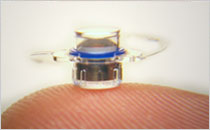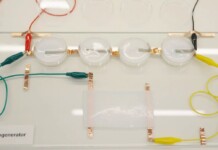 An implantable device to treat macular degeneration, a common cause of blindness in the elderly, has been approved by the Food and Drug Administration as safe and effective, the agency said Tuesday.
An implantable device to treat macular degeneration, a common cause of blindness in the elderly, has been approved by the Food and Drug Administration as safe and effective, the agency said Tuesday.
The tiny telescope made by VisionCare Ophthalmic Technologies Inc., is surgically implanted in one eye, as a replacement for the natural lens and projects an image to the healthy portion of the retina that has been magnified more than two times.
About 8 million people in the United States have age-related macular degeneration (AMD) and nearly 2 million of them already have significant vision loss, according to the National Eye Institute. AMD can make it difficult or impossible to recognize faces or perform daily tasks such as reading or watching television.
“This innovation has the potential to provide many people with an improved quality of life,” said Jeffrey Shuren, M.D., J.D., director of the FDA’s Center for Devices and Radiological Health.
But the new treatment which can be performed on an outpatient basis isn’t cheap. Reuters reports that the procedure, which will be done on an outpatient basis, will cost $17,000 to $20,000, with the implant comprising a significant proportion of that.
According to the FDA announcement: In a 219-patient, multi-center clinical study of the IMT, 90 percent of patients achieved at least a 2-line gain in either their distance or best-corrected visual acuity, and 75 percent of patients improved their level of vision from severe or profound impairment to moderate impairment.
There are risks to the cornea, due to the size of the implant, which effect less than ten percent of patients
As a condition of FDA approval, the manufacturer, VisionCare Ophthalmic Technologies Inc. of Saratoga, Calif., must conduct two post-approval studies. In one study, VisionCare must continue follow-up on the subjects from its long-term follow-up cohort for an additional two years. Another study of 770 newly enrolled subjects will include an evaluation of the endothelial cell density and related adverse events for five years after implantation.
(MORE details at FDA News, or NPR News blog)



















